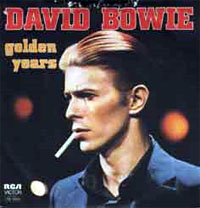| "Golden Years" | ||||
|---|---|---|---|---|
 | ||||
| Single by David Bowie | ||||
| from the album Station to Station | ||||
| B-side | "Can You Hear Me?" | |||
| Released | 21 November 1975 | |||
| Recorded | 21–30 September 1975 | |||
| Studio | Cherokee (Los Angeles) | |||
| Genre | ||||
| Length |
| |||
| Label | RCA | |||
| Songwriter(s) | David Bowie | |||
| Producer(s) |
| |||
| David Bowie singles chronology | ||||
| ||||
"Golden Years" is a song by the English musician David Bowie, released by RCA Records on 21 November 1975 as the lead single from his tenth studio album Station to Station (1976). Partially written before Bowie began shooting for the film The Man Who Fell to Earth (1976), the song was mostly compiled in the studio and was the first track completed for the album. Co-produced by Bowie and Harry Maslin, recording took place at Cherokee Studios in Los Angeles during September 1975. Due to Bowie's heavy cocaine use, he later recalled remembering almost nothing of Station to Station's production.
Musically, "Golden Years" is a funk and disco song that is reminiscent of the music on Bowie's previous album, Young Americans (1975), particularly "Fame", but with a harsher, grinding edge. The song utilises elements of several 1950s doo-wop tracks in its arrangement. Lyrically, the narrator offers a companion hope of entering a limousine and being isolated from the outside world. In other words, he assures his companion that she will always be protected by him and promises her a brighter future.
"Golden Years" has been viewed positively by music critics and biographers, who have highlighted its composition. Bowie preceded its release by miming the song on Soul Train, where he appeared incoherent. Upon release, the song was a commercial success, peaking at number eight in the UK and number ten in the US. The song was rarely played throughout Bowie's 1976 Isolar tour but regularly on other tours. "Golden Years" has appeared on lists of Bowie's best songs and has been included on various compilation albums, covered by numerous artists and made appearances in several films and soundtracks, including A Knight's Tale (2001), which featured a new remix by Bowie's longtime collaborator Tony Visconti.